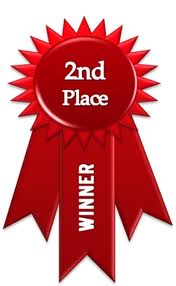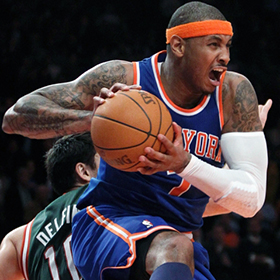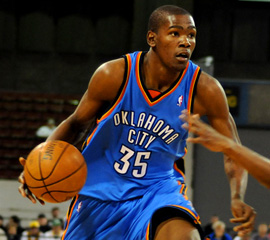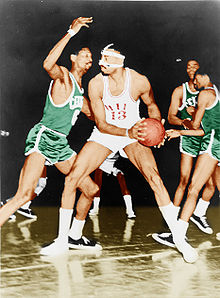 Perhaps the greatest indicator of LeBron James’ current dominance of the NBA is that the only controversy in Most Valuable Player voting is who deserves to be second.
Perhaps the greatest indicator of LeBron James’ current dominance of the NBA is that the only controversy in Most Valuable Player voting is who deserves to be second.There haven’t been many times in NBA history when that was the case – when it was one player doing a Secretariat and the field 31 lengths behind.
The closest in recent years probably was 1995-96 when Michael Jordan led the Bulls to a 72-10 record. He had 109 of 113 first-place votes that year, and it wouldn’t be surprising to see James get a larger percentage than that. when he gets this year’s award.
In other years, however, Jordan always seemed to have a challenger – Magic Johnson, Karl Malone or Charles Barkley. Even when Jordan was at his singular best in 1986-87 with a career-high average of 37.1 points per game, Magic was the MVP.
I am aware that in a number of years, there has been lopsided balloting – like Derrick Rose getting 113 of 121 first place votes two years ago. He was deserving of the award, but there has never been a discussion about him being the most dominant player in the league. He was simply recognized for having a great year.
James, like Jordan before him, is a commanding presence – a player physically and mentally overpowering. When James is the subject, the discussion is about the greatest ever.
Interestingly, the debate for second place this season is similar to arguments in many seasons and is an example of the difference between Rose and James. Is the MVP a player who is the most valuable to his team? Or is he the best player in the game?
It’s been awhile since the NBA added a new award, but I’ve thought in recent years that it would make sense to add an Offensive Player of the Year award. The NBA awards the MVP, best defender, best coach, best rookie, best sixth man and the most improved player.
 Why not the best offensive player?
Why not the best offensive player?It would not have to be the leading scorer, but could be. It would certainly bring recognition to the player and create additional interest in the league. For example, imagine a discussion of who is more deserving – a scorer, rebounder, or passer?
And it would also reduce the tendency of having to cast MVP votes for players because they score a lot. This season, for instance, if I had a vote, LeBron would be my MVP, Carmelo Anthony would be the Offensive Player of the Year and I’d vote Kevin Durant, Chris Paul and Tim Duncan ahead of Anthony on my MVP ballot.
I suppose some would argue that rewarding the best offensive player would highlight individual rather than team play, but the league already does that. When media vote for 15 players for the three All-NBA teams, they are rewarding players for individual play. They are not voting for the 15 most valuable players in the league.
 The current setup can also cause dilemma in other areas. For instance, looking at the ballot of our publisher and voting representative Chris Sheridan, he felt that if he was going to vote for LeBron James and Carmelo Anthony as 1-2 in the MVP race, he had to put Anthony on first team All-NBA and Kevin Durant on the second team. And that’s a legitimate viewpoint.
The current setup can also cause dilemma in other areas. For instance, looking at the ballot of our publisher and voting representative Chris Sheridan, he felt that if he was going to vote for LeBron James and Carmelo Anthony as 1-2 in the MVP race, he had to put Anthony on first team All-NBA and Kevin Durant on the second team. And that’s a legitimate viewpoint.But history tells us that one award doesn’t necessarily dictate the other. Bill Russell and Wilt Chamberlain produced the greatest rivalry in NBA history – far greater than even Larry Bird and Magic Johnson.
Wilt and Russell matched up a staggering 142 times against each other, according to the Official NBA Encyclopedia. Magic and Bird? Only 37 meetings.
As you might imagine, when it got to the end of the year and voting, which is done before the playoffs begin, it was difficult to choose between those two. Had the vote been held after the championship was decided, it would have been a little easier since Russell’s Celtics won 11 in 13 years.
 But with Wilt so dominant during the years, voters were split.
But with Wilt so dominant during the years, voters were split.In Russell’s second season of 1957-58, he was named Most Valuable Player, but he was on the All-NBA second team. Bob Pettit of the St. Louis Hawks was on the first team.
That happened three more times – 1960-61 and 1961-62 (Russell MVP, Wilt first team All-NBA) and 1972-73 (Dave Cowens MVP, Kareem Abdul-Jabbar first team All-NBA).
I have always contended that history determines what the philosophy on voting should be, so I informed Sheridan the other day that he could have voted for Durant first team All-NBA but still listed Anthony ahead of him on the MVP ballot. The Wilt-Russell era was precedent for that, and what better precedent is there?
Awards voting always generates discussion and that’s usually a plus for the league. It’s also a tribute to the media who vote because most of the writers and broadcasters take the voting very seriously. Others, not so much.
Yes, in the overall scheme of life, such a thing is not important. Yet it is important to voters to be informed, be fair and be responsible. Winning an award or being on an All-NBA team is something that not only a player remembers and enjoys forever, but so does his family. If you are going to do it, get it right.
(RELATED: SHERIDAN’S OFFICIAL NBA AWARDS BALLOT)
And more often than not, they do, although I have to say that the one award that probably needs a little bit more direction by the league is the Most Improved Player. The original idea was to honor a player who perhaps entered the NBA as a late-first or second-round pick, or even as a free agent, and then made a significant advancement.
But it now has become something else, as evidenced by Kevin Durant getting one second and one third place vote this season. The guy was the No. 2 pick in the draft and won three consecutive scoring titles. He’s great, but most improved? The award was not invented to honor the leading scorer. It was created to reward a struggling player who improved dramatically, or a good player who became great.
I guess we should be thankful that such voters weren’t around many years ago. In his third season, Wilt improved his average to 50.4 points from 38.4 the previous year. Imagine winning the MVP and most improved in the same season? Now that would be a lousy precedent.
CHECK OUT JAN HUBBARD’S ARCHIVE FROM SHERIDAN HOOPS.COM. GREAT STUFF ON THE NBA, THEN AND NOW.
Jan Hubbard has written about basketball since 1976 and worked in the NBA league office for eight years between media stints. Follow him on Twitter at @whyhub.